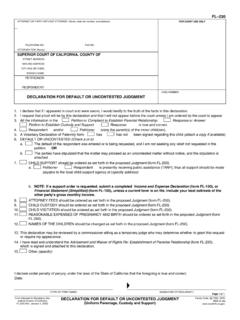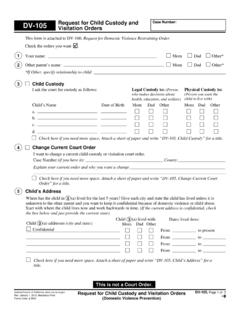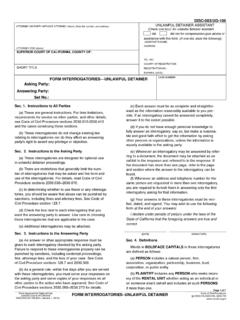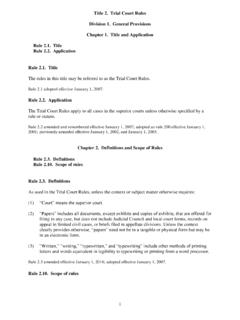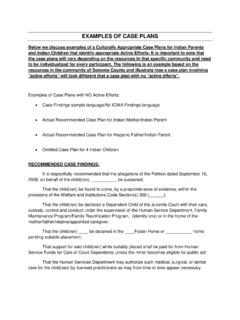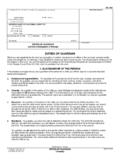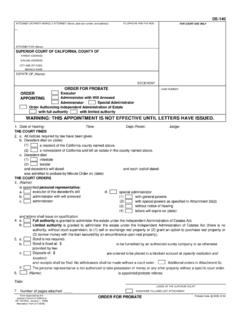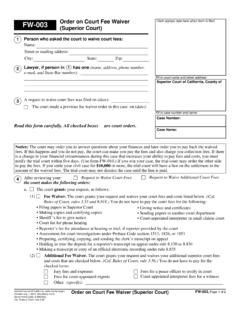Transcription of The Immigration and Nationality Act § 101 (8 U.S.C. § 1101 ...
1 THE Immigration AND Nationality ACT 101 (8 1101). TITLE I GENERAL. (a) As used in this Act Definitions [INA 101(a)(27)(J)]. (J) an immigrant who is present in the United States . (i) who has been declared dependent on a juvenile court located in the United States or whom such a court has legally committed to, or placed under the custody of, an agency or department of a State, or an individual or entity appointed by a State or juvenile court located in the United States, and whose reunification with 1 or both of the immigrant 's parents is not viable due to abuse, neglect, abandonment, or a similar basis found under State law.
2 (ii) for whom it has been determined in administrative or judicial proceedings that it would not be in the alien's best interest to be returned to the alien's or parent's previous country of Nationality or country of last habitual residence; and (iii) in whose case the Secretary of Homeland Security consents to the grant of special immigrant juvenile status, except that . (I) no juvenile court has jurisdiction to determine the custody status or placement of an alien in the custody of the Secretary of Health and Human Services unless the Secretary of Health and Human Services specifically consents to such jurisdiction; and (II) no natural parent or prior adoptive parent of any alien provided special immigrant status under this subparagraph shall thereafter, by virtue of such parentage, be accorded any right, privilege, or status under this Act[.]
3 ]. TITLE 8 ALIENS AND Nationality . CHAPTER I DEPARTMENT OF HOMELAND SECURITY ( Immigration AND. NATURALIZATION). SUBCHAPTER B Immigration REGULATIONS. PART 204 immigrant PETITIONS. SUBPART A immigrant VISA PETITIONS. 8 CFR special immigrant status for certain aliens declared dependent on a juvenile court ( special immigrant juvenile). (a) Definitions. Eligible for long-term foster care means that a determination has been made by the juvenile court that family reunification is no longer a viable option. A child who is eligible for long-term foster care will normally be expected to remain in foster care until reaching the age of majority, unless the child is adopted or placed in a guardianship situation.
4 For the purposes of establishing and maintaining eligibility for classification as a special immigrant juvenile, a child who has been adopted or placed in guardianship situation after having been found dependent upon a juvenile court in the United States will continue to be considered to be eligible for long-term foster care. Juvenile court means a court located in the United States having jurisdiction under State law to make judicial determinations about the custody and care of juveniles. (b) petition for special immigrant juvenile.
5 An alien may not be classified as a special immigrant juvenile unless the alien is the beneficiary of an approved petition to classify an alien as a special immigrant under section 101(a)(27) of the Act. The petition must be filed on Form I-360, petition for amerasian , Widow(er) or special immigrant . (1) Who may file. The alien, or any person acting on the alien's behalf, may file the petition for special immigrant juvenile status. The person filing the petition is not required to be a citizen or lawful permanent resident of the United States.
6 (2) Where to file. The petition must be filed at the district office of the Immigration and Naturalization Service having jurisdiction over the alien's place of residence in the United States. (c) Eligibility. An alien is eligible for classification as a special immigrant under section 101(a)(27)(J) of the Act if the alien: (1) Is under twenty-one years of age;. (2) Is unmarried;. (3) Has been declared dependent upon a juvenile court located in the United States in accordance with state law governing such declarations of dependency, while the alien was in the United States and under the jurisdiction of the court.
7 (4) Has been deemed eligible by the juvenile court for long-term foster care;. (5) Continues to be dependent upon the juvenile court and eligible for long-term foster care, such declaration, dependency or eligibility not having been vacated, terminated, or otherwise ended;. and (6) Has been the subject of judicial proceedings or administrative proceedings authorized or recognized by the juvenile court in which it has been determined that it would not be in the alien's best interest to be returned to the country of Nationality or last habitual residence of the beneficiary or his or her parent or parents.
8 Or (7) On November 29, 1990, met all the eligibility requirements for special immigrant juvenile status in paragraphs (c)(1) through (c)(6) of this section, and for whom a petition for classification as a special immigrant juvenile is filed on Form I-360 before June 1, 1994. (d) Initial documents which must be submitted in support of the petition . (1) Documentary evidence of the alien's age, in the form of a birth certificate, passport, official foreign identity document issued by a foreign government, such as a Cartilla or a Cedula, or other document which in the discretion of the director establishes the beneficiary's age.
9 And (2) One or more documents which include: (i) A juvenile court order, issued by a court of competent jurisdiction located in the United States, showing that the court has found the beneficiary to be dependent upon that court;. (ii) A juvenile court order, issued by a court of competent jurisdiction located in the United States, showing that the court has found the beneficiary eligible for long-term foster care; and (iii) Evidence of a determination made in judicial or administrative proceedings by a court or agency recognized by the juvenile court and authorized by law to make such decisions, that it would not be in the beneficiary's best interest to be returned to the country of Nationality or last habitual residence of the beneficiary or of his or her parent or parents.
10 (e) Decision. The petitioner will be notified of the director's decision, and, if the petition is denied, of the reasons for the denial. If the petition is denied, the petitioner will also be notified of the petitioner's right to appeal the decision to the Associate Commissioner, Examinations, in accordance with part 103 of this chapter. HISTORY: [56 FR 23208, May 21, 1991; redesignated at 58 FR 42849, Aug. 12, 1993; 58 FR 42850, Aug. 12, 1993]. [NOTE: These regulations have not been amended to reflect the 1997 or 2008 SIJS statutory changes.]
